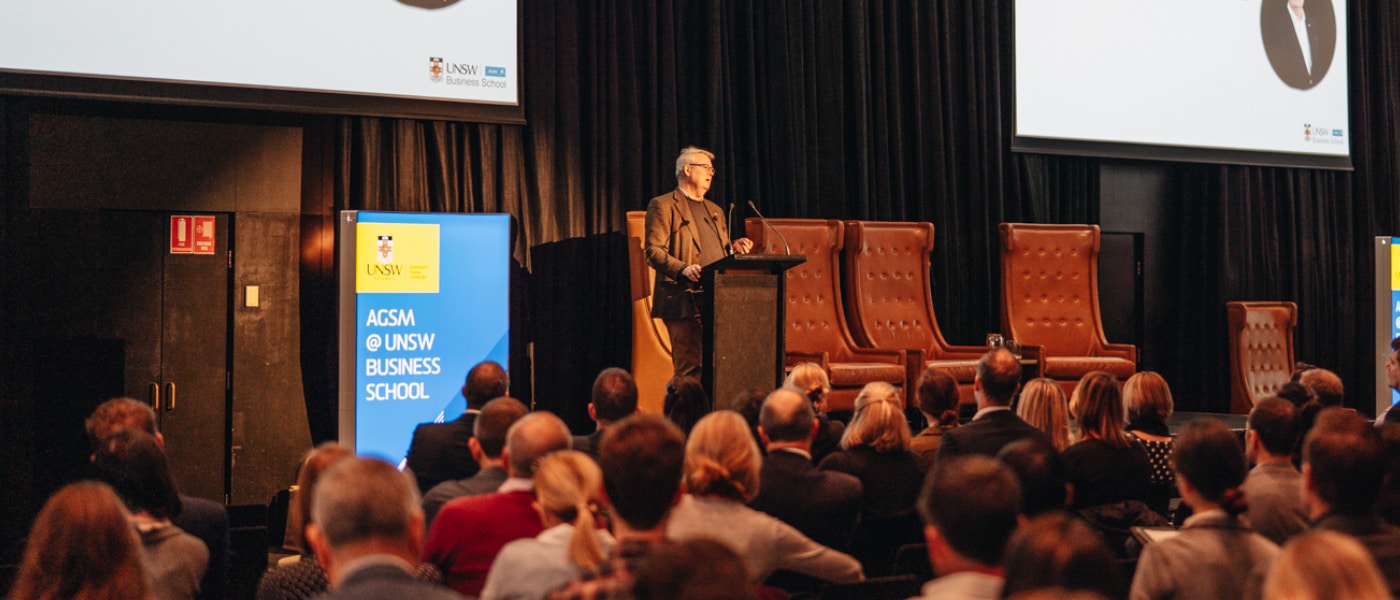
The role of the ethical leader in an accelerating world
Opinion + AnalysisBusiness + LeadershipRelationships
BY Simon Longstaff 9 JUL 2019
Dr Simon Longstaff, Executive Director of The Ethics Centre, opened the recent AGSM Professional Forum: Ethical Leadership in an Accelerating World by acknowledging today’s leaders are confronted with a pace of change that is increasingly rapid, complex and deep in its implications.
They are grappling with multiple dynamic forces as they make strategic business decisions, uncover new market opportunities, and maintain their sense of purpose.
And, as we move into the Age of Purpose, they must measure up to the moral expectations of their employees, stakeholders and the public – while building trust in an increasingly sceptical environment.
As one of Australia’s leading ethicists and philosophers, Dr Longstaff said he believes ethics need to be intrinsic within leaders, especially in a time where civilisation is going through enormous change. And this starts with leaders in the boardroom. “I’d like to reframe leadership itself as an ethical practice. You can’t just add ethics into leadership. If that’s what you’re doing, you’ve misunderstood what leadership is,” he said.
Strengthening the decision-making muscle
Historically, decision-making in organisations has been heavily regulated – and Dr Longstaff says that makes it due for an overhaul. Only then can more robust ethical practices flourish throughout organisations.
“For 30 years or more, leaders have been trying to manage the rate, complexity and depth of change through the exercise of control,” said Dr Longstaff. “In this country the most prolific regulators are not in parliaments or at APRA. They’re in the boardrooms of Australia.”
He says the system has been so finely meshed that no one can choose to do anything wrong. And as a result we’ve begun to create new forms of systemic risk.
“Inside corporations, there are measures designed to make it safe. But if you create a world in which no one can choose to do anything wrong, it also means no one can choose to do anything right,” said Dr Longstaff. “If you don’t choose – you comply. And like any skill, if this muscle isn’t used and flexed, it withers away.”
This systemic impact was most clearly demonstrated in the findings of the recent Royal Commission into Misconduct in the Banking, Superannuation and Financial Services Industry. The findings uncovered the implications of inaction and the way leadership behaviour can detrimentally impact stakeholder sentiment and damage trust in an organisation.
“In many cases of a compliant culture, when asked why a certain decision has been made, the answer is ‘that’s the way things have always been done’,” said Dr Longstaff. “But the fact we can do something doesn’t mean we should do it. To do so is a sign of a cultural failure, where ethical restraint should have been exercised.”
This is what Dr Longstaff calls ‘unintended negative strategic effect’: Something that can only be rectified by progressive and collaborative leaders.
“People are inherently good,” he said. “Leaders don’t wake up thinking ‘today I’m going to see how much hypocrisy I can engage in’. They are susceptible to the greater threat of unthinking custom and practice. And this must change,” he said.
Leading with moral courage and strategic vision
To create more ethical practices, Dr Longstaff suggests leaders guide their organisations through a process of ‘constructive subversion’ – to break the cycle of ‘going with the flow’ and embedding reflective practice within its culture.
“To subvert unthinking custom and practice, decision-making processes need to come back to the notion of purpose, values and principles,” says Dr Longstaff.
An organisation must have the right intent if it is to achieve its goals. To manage this, Dr Longstaff says leaders need these three key qualities:
- Moral courage – “Leaders need to have courage at the right time in the right way to offer the practice and skills to subvert unthinking.”
- Imagination – “Great leaders can imagine what it’s like to be somebody else, whether friend or foe, and understand how they see the world.”
- Strategic vision – “Leaders need the capacity to invent or discover inflection points – knowing when it’s time to action significant change.”
If leaders can set an organisation’s intention to realise its purpose-led potential, then their people can exercise their own discretion once they adopt this belief. This breaks the cycle of unthinking practice that leads to distrust from stakeholders and shareholders.
“Trust is not hard to build or sustain – there’s no real mystery about it. It’s created when individuals or organisations can declare publicly ‘this is who we are and this is what we stand for’ and act in a manner that is consistent with that’,” said Dr Longstaff.
In his keynote’s conclusion, Dr Longstaff came back to purpose and the existing structures that are in need of an overhaul.
“What is the purpose of a bank? A corporation? A market? Limited liability? All of them have purposes – and almost all of these have been forgotten,” said Dr Longstaff.
“As a society of citizens and colleagues, when we think about ethical leadership, we have to ask ourselves what we want and what will we settle for? A world of control, compliance and surveillance? Even if that was to work, would it diminish who we are as human beings?”
This article was originally published by UNSW, republished with permission.
Ethics in your inbox.
Get the latest inspiration, intelligence, events & more.
By signing up you agree to our privacy policy
You might be interested in…
Opinion + Analysis
Relationships, Society + Culture
I’m really annoyed right now: ‘Beef’ and the uses of anger
Opinion + Analysis
Business + Leadership, Relationships
Game, set and match: 5 principles for leading and living the game of life
Opinion + Analysis
Health + Wellbeing, Relationships, Science + Technology
Hallucinations that help: Psychedelics, psychiatry, and freedom from the self
Opinion + Analysis
Politics + Human Rights, Relationships





